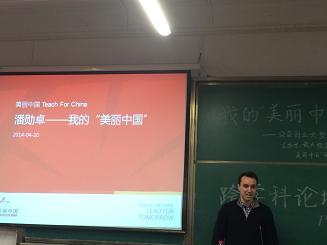At 6:30 p.m. On April 20th, Andrea Pasinetti (Chinese name: Xunzhuo Pan), founder and CEO of Teach for China delivered an impressive speech to students in Wuhan University about how he became so attached to China that he eventually dropped out of Princeton University and started Teach For China: a nonprofit organization that recruits outstanding university graduates to serve as teachers for two years in under-resourced Chinese schools. A large audience attended his speech including students not only from WHU but from other local universities as well.
After a short introduction by the hostess, Pasinetti began his story in fluent Chinese. Pasinetti originally majored in math, but in his junior year, he realized that he would become “an indoorsy nerd” if he continued to pursue math. Instead, he began to pursue courses in the East Asian Studies and European Cultural Studies Departments and eventually went to Tsinghua University to conduct research and to study Chinese. In 2007, Pasinetti made a trip to Linchang, Yunnan where he visited a local primary school, a trip that changed his life’s trajectory. Sitting in a grade six class and speaking with the kids, he realized that the students there were “no less intelligent than he had been at their age” but had little opportunity to advance because they couldn’t even go to middle school, let alone university. While nearly 80% of students from large Chinese cities will have the chance to attend college, only 5% of poor rural students will have the same opportunity. Pasinetti realized that so much of what he had taken for granted had been “a function of where I had been born.” Guided by a strong sense of mission and responsibility, he decided to make a difference in these children’s lives. He withdrew his senior year tuition savings and founded the China Education Initiative in 2008, which later became known as Teach For China. “I did not really know then what lay ahead, but I felt compelled to give my best effort and see just how far I could go”, he recalled, “I just thought all the kids should have equal access to education, regardless of their family background”. This belief drove him to start TFC, and has kept him devoted to the project ever since. Initially, TFC only had 18 Fellows; yet after 6 years of development, it has had over 300. It has also partnered with the global Teach For All network seeking to tackle education inequality. Pasinetti said that his aim was to have around 1000 fellows by 2015. One reason the program has been so successful is that post-fellowship alumni enjoy a rich network of opportunities across all sectors, and some of them even create their own nonprofit organizations like “Education in Sight” that provides students in many partner communities with glasses.
Teach For China has changed the life of tens of thousands of rural children in China. In the 2012-2013 school year, more than 200 Teach For China Fellows taught in 55 schools in China's Yunnan and Guangdong provinces, reaching more than 30,000 students and witnessing their tremendous progress. “I am so proud of the fact that Teach For China caused the paths of many outstanding graduates to cross with those of these children. I deeply believe that the problem we are looking to address can be fundamentally changed by the commitment of those who undertake this mission,” Pasinetti wrote in an article. “Nearly 30% Harvard graduates apply for Teach For America Program annually; it has become a culture. So I hope this can also become a culture in prominent Chinese universities that drives outstanding students to become a part of our team and to right the wrong.”
For all the work he has done, Pasinetti was recognized in 2011 as the most influential foreigner working in China by China Newsweek Magazine, and in 2014 as one of the 214 Young Global Leaders by the World Economic Forum.
During the Q&A session after the speech, enthusiastic students raised a wide range of questions, while Pasinetti patiently addressed as many as he could. In his closing remarks, Pan called on all the students present to take two years of their lifetime and contribute to rectifying education imbalances in China.
(edited by Yoni)



